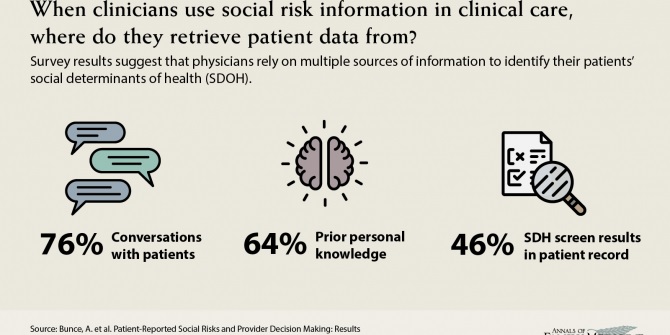Patient-Reported Social Risks and Medical Decision Making : Results of a Medical Survey in Primary Care Community Health Centers
Integrating patients’ social determinants of health into the EHR, along with clinical conversations, can help clinicians provide more personalized and preventative care.

A recent study conducted in a large nonprofit network of community health centers assessed the extent to which social determinants of patient health influence the decisions of safety-net primary care physicians at the point of care. attention, and how that information caught the doctor’s attention. Descriptive statistics and generalized estimating equation models were used to evaluate relationships between physician, patient, and encounter characteristics and physician-reported use of social determinants of health data in clinical decision making.
Social determinants of health influenced care in 35% of the encounters investigated. The most common sources of information about social determinants of patient health were conversations with patients (76%); prior knowledge of the social determinants of the patient’s health (64%); and social determinants of health information documented in the EHR (46%).
Social determinants of health were significantly more likely to influence care for male and non-English speaking patients, and those with social determinants of health screening data documented in discrete fields (i.e., more easily measurable and reportable) in the EHR. The authors say EHRs present an opportunity to help clinicians integrate information about patients’ social and economic circumstances into care planning.
What is known about this topic : Although there is increased interest in social risk screening in primary care settings and how that knowledge might impact patient outcomes, little is known about how and whether social risk information influences doctors’ decisions at the time the patient presents to the clinic.
What this study adds : Using an EHR-embedded card study, which is a unique method of obtaining information about doctor-patient interactions, the research team found that the combination of discrete social determinants of the Health information and targeted conversations provide the nuanced data that enables personalized care.
Conclusions Electronic health records present an opportunity to help clinicians integrate information about patients’ social and economic circumstances into care planning. Study findings suggest that standardized assessment SDOH information documented in the EHR, combined with patient-clinician conversations, may enable social risk-adjusted care. Electronic health record tools and clinic workflows could be used to support both documentation and conversations. Study results also identified factors that may direct clinicians to include SDOH information in point-of-care decision making. Future research should explore this topic further. |
Reference : Patient-Reported Social Risks and Clinician Decision Making: Results of a Clinician Survey in Primary Care Community Health Centers. The Annals of Family Medicine . DOI: https://doi.org/10.1370/afm.2953















